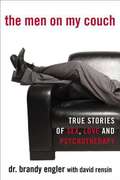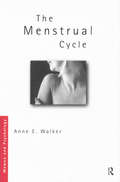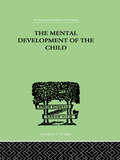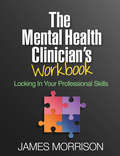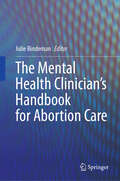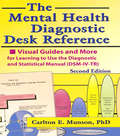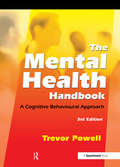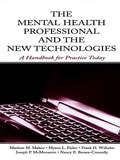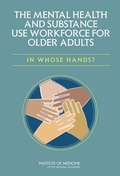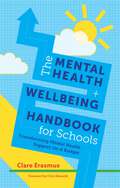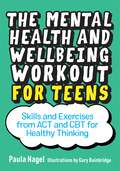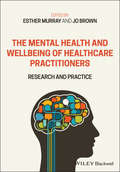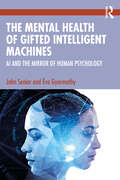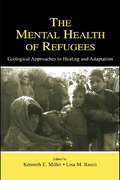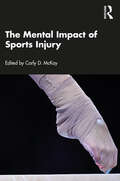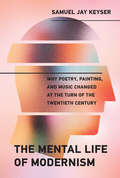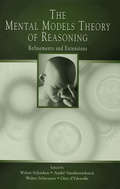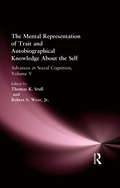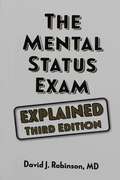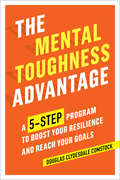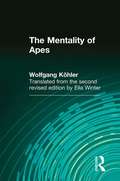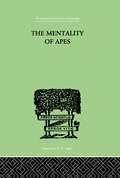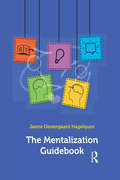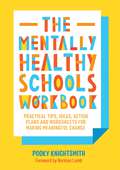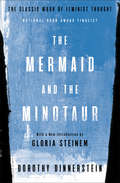- Table View
- List View
The Men on My Couch
by David Rensin Brandy EnglerWHAT MEN WANT. WHAT MEN FEEL. WHAT WOMEN NEED TO KNOW. When Dr. Brandy Engler opened her sex therapy practice for women in Manhattan, she got a big surprise. Most of the calls were from men. They wanted to talk about womanizing, porn addiction, impotence, prostitutes--and most of all, love. Her patients were everyday guys from all walks of life. Among them were David, the Wall Street hotshot and compulsive womanizer; Charles, an introvert who kept pushing away the fiancée he thought was too beautiful for him; Paul, the self-made man who visited massage parlors despite his sexy wife; and the men's group whose stark revelations about male anger and their search for the right woman will open your eyes. In The Men on My Couch, Dr. Engler allows readers inside those private sessions to witness her exciting and evocative encounters with what men desire and fear. Dr. Engler tells her own story, too. At first her patients' revelations are painful and disconcerting, especially against the backdrop of her own difficult love affair. Yet Dr. Engler lets readers experience how she evolves both professionally and personally, from chagrin to compassion, and reconciles her idealized notions of love and sex with the unexpected and raw truths she hears in the office. The Men on My Couch is unlike books you've read before. There are no tired facile conclusions or pejorative generalizations. Here are fresh insights into modern sexual maladies, gleaned from real people having real struggles and experiencing real epiphanies--in the real world. This book will change how both women and men think about love, sex, and desire.
The Menstrual Cycle (Women and Psychology)
by Anne WalkerAnne Walker shows that women are neither the victims of raging hormonal fluctuations nor entirely unaffected by them. Unlike most previous publications that focus on menstruation (a part of the cycle), The Menstrual Cycle presents a well researched study of the entire menstrual cycle and its relationship to women's lives.Women's own experiences in different cultures are contrasted with medical textbook descriptions and the "normal" is found to be rather elusive.This book will be read by discourse analysts, doctors, nurses and any woman who has felt curious about her menstrual cycle and its possible effects.
The Mental Development of the Child: A Summary of Modern Psychological Theory
by Buhler, KarlThis is Volume VI of thirty-two in the Developmental Psychology series. First published in 1930, this study presents a summary of the psychological theory of the time, on the mental development of a growing child considering memory, development of perception, imagination, ability to draw and evolution.
The Mental Health Clinician's Workbook: Locking In Your Professional Skills
by James MorrisonRich with compelling case material, this hands-on workbook helps mental health practitioners and students build essential skills for clinical evaluation and differential diagnosis. Renowned diagnostician and bestselling author James Morrison (DSM-5 Made Easy and other works) invites the reader to interview and evaluate 26 patients with a wide spectrum of presenting complaints and ultimate diagnoses. Using multiple-choice questions and fill-in-the-blank exercises, clinicians practice the arts of interviewing and making diagnostic decisions. The convenient large-size format facilitates use. Extensive tables in the appendix provide a quick-reference guide to the interviewing techniques, diagnostic principles, and clinical diagnoses discussed in each case. See also Morrison's DSM-5® Made Easy, which explains DSM-5 diagnoses in clear language, illustrated with vivid case vignettes; Diagnosis Made Easier, Second Edition, which offers principles and decision trees for integrating diagnostic information from multiple sources; and The First Interview, Fourth Edition, which presents a framework for conducting thorough, empathic initial evaluations.
The Mental Health Clinician’s Handbook for Abortion Care
by Julie BindemanOver the span of history, not all pregnancies were met with welcome and anticipation. As it continues today, an unwanted pregnancy can be seen in many different lights: an inconvenience, a crisis or a turning point. From June 1973 up until June of 2022, people in the United States capable of becoming pregnant could (to varying degrees) access healthcare that would end an unwelcome pregnancy. Now that this right has been gutted, the consequences are far-reaching and ever-unfolding. In clinician offices, the issue of abortion might seem remote based upon the population being seen. However, this issue impacts those long past reproductive age and is an important event that most therapists are woefully unprepared to deal with should it come up. With abortion in the news, previous experiences of abortion can come up as memories for clients past their reproductive years or with younger clients, an inability and fear to stop an unwanted pregnancy. As clinicians are human, we come to this issue with our own moral, religious and experiential baggage that might blind us as how to best support our clients. This book is an important addition to the scant amount of literature available for clinicians that might unexpectedly be faced with a client that is struggling with an abortion decision or access. The most recent book was published over five years ago under a completely different legislative landscape. In addition to assisting clinicians in client care, this book will also speak to potential legal risks to clinicians about abortion help.
The Mental Health Diagnostic Desk Reference: Visual Guides and More for Learning to Use the Diagnostic and Statistical Manual (DSM-IV-TR), Second
by Carlton MunsonMake the DSM-IV-TR user-friendly with this powerful learning tool! This expanded and updated edition of Dr. Munson's highly acclaimed book is the indispensable companion volume and guide to Diagnostic and Statistical Manual of Mental Disorders, Fourth Edition-Text Revision (DSM-IV-TR), published by the American Psychiatric Association. The only study guide currently available for the DSM-IV-TR, The Mental Health Diagnostic Desk Reference, Second Edition, provides clear, cogent expositions of every disorder in the manual. All the information in this edition has been updated to reflect the new thinking and the current criteria. Easy to use in a consistent, all-inclusive format, The Mental Health Diagnostic Desk Reference, Second Edition, offers a detailed explanation of every part of the DSM-IV-TR, from its multi-axial classification system to the criteria for diagnosing individual disorders. It offers guidelines of diagnosis, examples of treatment planning, and 81 helpful illustrations, including color-coded supplemental visuals highlighting the diagnostic criteria for disorders most frequently encountered in clinical practice. It even features a thorough review of the 26 syndromes considered for inclusion in the DSM-IV-TR that did not reach the research criteria for a full-scale disorder.In addition, The Mental Health Diagnostic Desk Reference, Second Edition, is the only guide to applying the new culture-bound syndromes. It even includes a detailed case example of preparing a cultural formulation. References are provided at the end of each chapter, and a master reference list is printed at the end of the book, which enhances ease of use.Summaries for each class of disorders include: a listing of codes and disorders a fundamental features section describing core aspects of disorders brief tips to highlight significant information and helpful diagnostic techniques differential diagnosis strategies and tips standardized measures and scales recommended for their effectiveness, ease of use, brevity of administration, and cost recommended readingWritten by nationally respected clinician, supervisor, and educator Dr. Carlton Munson, The Mental Health Diagnostic Desk Reference, Second Edition, will help end clinical gridlock and enable you to improve services to your clients within the context of managed care.
The Mental Health Handbook: A Cognitive Behavioural Approach
by Trevor PowellThis is an extremely comprehensive resource of photocopiable handouts to aid therapeutic intervention. This treasury of successful photocopiable handouts is sensibly organised for quick access in one convenient package. Now updated, the third edition incorporates the latest developments in Cognitive Behavioural Therapy and includes new pages, as well as expanded sections on Psychosis and OCD. The handouts are designed to be photocopied or printed from the downloadable resources and handed to clients to supplement treatment programmes. Now with more than 200 photocopiable sheets including graded practice sheets, checklists, behavioural symptoms questionnaires, rating scales, home assignments, analysis sheets, goal plans and self-monitoring exercises. This title includes handouts on a huge range of mental health issues, grouped under the headings of: Managing Anxiety, Assertiveness Training, Managing Depression, Managing Stress, Changing Habits & Behaviour, Coping with Psychosis, Bipolar Disorder and Dementia. This revised edition contains extended sections on Obsessional Compulsive Disorder and Managing Psychosis, and new sections on Mindfulness, Resilience, Forgiveness, Responsibility, Behavioural Experiments, Guilt, Distress Tolerance and Bipolar Disorder.
The Mental Health Professional and the New Technologies: A Handbook for Practice Today
by Marlene M. Maheu Myron L. Pulier Frank H. Wilhelm Joseph P. McMenamin Nancy E. Brown-ConnollyIn the last two decades, new communication technologies have dramatically changed the world in which mental health professionals and their patients live. Developments such as e-mail, online chat groups, Web pages, search engines, and electronic databases are directly or indirectly affecting most people's routines and expectations. Other developments are poised to do so in the near future. Already, for example, patients are acquiring both good and bad advice and information on the Web; many expect to be able to reach their therapists by e-mail. And already there is pressure from third party payers for providers to submit claims electronically. These technological breakthroughs have the potential to make mental health care more widely available and accessible, affordable, acceptable to patients, and adaptable to special needs. But many mental health professionals, as well as those who train them, are skeptical about integrating the new capabilities into their services and question the ethical and legal appropriateness of doing so. Those unfamiliar with the technologies tend to be particularly doubtful. How much e-mail contact with patients should I encourage or permit, and for what purposes? Why should I set up a Web site and how do I do so and what should I put on it? Should I refer patients to chat groups or Web-based discussion forums? Could video-conferencing be a helpful tool in some cases and what is involved? How do I avoid trouble if I dare to experiment with innovations? And last but not least, will the results of my experimentation be cost-effective? The book includes: an extensive overview of legal and regulatory issues, such as those raised by the Health Insurance Portability and Accountability Act (HIPAA); concrete technical, ethical, and managerial suggestions summarized in a seven-step Online Consultation Risk Management model; and how to" resource lists and sample documents of use to beginners and experienced professionals alike. For better or worse, no mental health professional today can avoid confronting the issues presented by the new technologies. The Mental Health Professional and the New Technologies: A Handbook for Practice Today will enormously simplify the job of thinking through the issues and making clinically, ethically, and legally prudent decisions.
The Mental Health and Substance Use Workforce for Older Adults
by Jill EdenAt least 5. 6 million to 8 million--nearly one in five--older adults in America have one or more mental health and substance use conditions, which present unique challenges for their care. With the number of adults age 65 and older projected to soar from 40. 3 million in 2010 to 72. 1 million by 2030, the aging of America holds profound consequences for the nation. For decades, policymakers have been warned that the nation's health care workforce is ill-equipped to care for a rapidly growing and increasingly diverse population. In the specific disciplines of mental health and substance use, there have been similar warnings about serious workforce shortages, insufficient workforce diversity, and lack of basic competence and core knowledge in key areas. Following its 2008 report highlighting the urgency of expanding and strengthening the geriatric health care workforce, the IOM was asked by the Department of Health and Human Services to undertake a complementary study on the geriatric mental health and substance use workforce. The Mental Health and Substance Use Workforce for Older Adults: In Whose Hands? assesses the needs of this population and the workforce that serves it. The breadth and magnitude of inadequate workforce training and personnel shortages have grown to such proportions, says the committee, that no single approach, nor a few isolated changes in disparate federal agencies or programs, can adequately address the issue. Overcoming these challenges will require focused and coordinated action by all.
The Mental Health and Wellbeing Handbook for Schools: Transforming Mental Health Support on a Budget
by Clare ErasmusThis book lays out an intuitive and practical approach to mental health and wellbeing that any school can adopt to transform their mental health support for students.With a focus on providing staff with practical tools on a limited budget, the book helps schools make a real difference to student mental health. It sets out a roadmap for staff to create robust mental health support for students without requiring qualifications in psychology or counselling. It covers key areas including staff training, creating safe spaces for wellbeing and how to harness the support of parents and the local community. It also includes practical advice for addressing concerns such as stress, self-harm and body image.From small, everyday improvements that foster a culture of mental wellbeing to whole school campaigns, this book shows how to embed mental health at the heart of a school's philosophy.
The Mental Health and Wellbeing Workout for Teens: Skills and Exercises from ACT and CBT for Healthy Thinking
by Paula NagelThis easy-to-understand, engaging guide arms teens with healthy thinking habits and coping strategies for staying on top of their mental health. Using tried and tested therapeutic techniques, readers are given the tools to build their own personalised mental health 'workout' to boost their emotional resilience and wellbeing.Informed by the experiences of teens themselves, this friendly guide gives practical tips and strategies on how to overcome everyday stresses and ditch negative thinking 'frenemies' before they develop into more serious issues. Teens will be better equipped to recognise negative thoughts and emotions, monitor their mood and behaviour, and flex their positive thinking muscles in order to combat the mental health blips we all face sometimes.
The Mental Health and Wellbeing of Healthcare Practitioners: Research and Practice
by Jo Brown Esther MurrayTHE MENTAL HEALTH AND WELLBEING OF HEALTHCARE PRACTITIONERS Explore this innovative new volume covering the growing mental health crisis amongst healthcare practitionersIn The Mental Health and Wellbeing of Healthcare Practitioners, accomplished researchers and authors Esther Murray and Jo Brown deliver an insightful exploration of the theoretical and practical aspects of implementing mental health improvement within the healthcare system through a range of practical examples and cases.The book also explores the possibilities available to professionals to talk about their mental health using “borrowed” words and concepts, and uncovers structural and social concerns that prevent practitioners from accessing the time and space they need to address their mental health concerns.Readers will also benefit from the inclusion of topics such as:Borrowed words in emergency medicine and how moral injury makes spaces for talkingFinding a voice through medical student engagement in creative enquiryUsing language and discourse to explore queer identities in medicineStress and mental wellbeing in emergency medical dispatchers and paramedicsPerfect for healthcare students, professionals, and researchers in the fields of medicine, medical education, psychology, and sociology, The Mental Health and Wellbeing of Healthcare Practitioners will also earn a place in the libraries of healthcare management professionals and regulators.
The Mental Health of Gifted Intelligent Machines: AI and the Mirror of Human Psychology
by John Senior Éva GyarmathyThe Mental Health of Gifted Intelligent Machines explores the increasingly sophisticated behaviours of developing AI and how we can ensure it will have emotional resilience, ethical strength and an ability to think in a new and enhanced way. Its primary aim is to change how we understand the world by investigating humanity as an intelligent being, examining and contrasting human and artificial intelligence. The book considers what we can learn from the likely mental health issues that will occur with increasingly sophisticated aspects of machine intelligence and how they will reflect the human condition. It asks questions about our identity in a deeply uncertain and disruptive ever-changing world; how we will improve and enhance our psychological intelligence to meet the increasing complications and demands of the future; and what we need to do, now, to be psychologically intelligent enough to live a full meaningful life in a new world evolving around us. The book argues that changes in our understanding of mental health, psychology and our view of intelligence will challenge huge aspects of our fundamental beliefs and assumptions and that it is essential we explore new arenas to further understand both our own human psychological issues and mental health as we develop gifted intelligent machines. It is a must read for all students, researchers and professionals involved with AI, gifted education, consciousness and mental health.
The Mental Health of Refugees: Ecological Approaches To Healing and Adaptation
by Lisa M. Rasco Kenneth E. MillerIt is estimated that at least 33 million people around the world have been displaced from their homes by war or persecution. Numerous studies have documented high rates of psychological distress among these survivors of extreme violence and forced migration, yet very few have access to clinic-based mental health care. In any case, clinic-based services cannot adequately address the constellation of displacement-related stressors that affect refugees daily, whether in a new region of their homeland or a new country--stressors such as social isolation, the loss of previously valued social roles, poverty and a lack of employment opportunities, and difficulties obtaining education and medical care. Additionally, many refugees from non-western societies find western methods of psychiatric and psychological healing culturally alien or stigmatizing, and therefore underutilize such services. This book brings together an international group of experts on the mental health of refugees who have pioneered a new approach to healing the psychological wounds of war and forced migration. Their work is guided by an ecological model, which, in contrast to the prevailing medical model of psychiatry and clinical psychology, emphasizes the development of culturally grounded mental health interventions in non-stigmatized community settings. The ecological model also prioritizes synergy with natural community resources to promote adaptation, prevention over treatment, the active involvement of community members in all phases of the intervention process, and the empowerment of marginalized communities to address their own mental health needs. Drawing on their expertise in community psychology, prevention science, anthropology, social psychology, social psychiatry, public health and child development, the authors present a variety of highly innovative, culturally grounded interventions designed to improve the mental health and psychosocial well-being of communities that have survived the nightmares of political repression, civil war, and genocide. They discuss the various conceptions of well-being and distress that have informed their projects, their own integrations of western and indigenous approaches to understanding and relieving psychological distress, and in several instances their creative use of well-trained paraprofessionals. They examine with remarkable candor the challenges they have faced in carrying out their work in extraordinarily demanding conditions. An extended introductory chapter reviews and analyzes what we know about the impact of political violence and exile on mental health, and lays out the ecological model in rich theoretical and empirical context. The first of two concluding chapters addresses the critical and often-neglected issue of the evaluation of community-based interventions in conflict and post-conflict settings; the second sums up the implications of the achievements and limitations of the programs described, poses questions that must be answered, such as "How adequate is the PTSD construct in capturing the nature of refugee trauma?", and suggests numerous directions for future research and practice. The Mental Health of Refugees: Ecological Approaches to Healing and Adaptation is an essential reference for all professionals who seek to serve members of this vulnerable population, for those who train and supervise them, and for program administrators and policymakers concerned with refugee well-being. It is also an excellent resource for graduate courses in public mental health, community psychology and psychiatry, refugee and immigrant studies, psychological trauma, medical anthropology, and ethnopolitical violence.
The Mental Impact of Sports Injury
by Carly D. McKayMuch is known about the physical strain that athletes’ bodies are subjected to and the dangerous aspects of competition immediately spring to mind. But why do athletes train the way they do, and why do they push the limits? Why do some recover well from injury while others struggle? Despite decades of medical and sport science research, a piece has been missing from this picture. Until recently, the role of psychological factors in risk and rehabilitation has been poorly understood. Thankfully, there is increasing awareness of just how crucial these factors can be for predicting injury, improving recovery, developing prevention strategies, and supporting athletes’ long-term health. Yet, research in this area is still in its infancy and it can be difficult to synthesize an ever-growing body of knowledge into practical injury management approaches. Using analogies from everyday life, The Mental Impact of Sports Injury bridges the gap between academic research and practical settings in an informative, yet easy to follow guide to the psychology of sports injury. Addressing risk, rehabilitation, and prevention, it outlines key considerations for researchers and practitioners across all levels of sport. Alongside the fundamentals of injury psychology, emerging areas of importance are also discussed, including training load monitoring and the technological advances that are shaping modern sport medicine. Targeted examples highlight the challenges of preventing and managing injury in grassroots, elite, and professional contexts, with chapters dedicated to the under-served communities of youth and Para sport athletes. Stepping away from traditional texts, this unique book presents the landmark literature, major concepts, and athlete insights into sports injury psychology from a totally new perspective.
The Mental Life of Modernism: Why Poetry, Painting, and Music Changed at the Turn of the Twentieth Century
by Samuel Jay KeyserAn argument that Modernism is a cognitive phenomenon rather than a cultural one.At the beginning of the twentieth century, poetry, music, and painting all underwent a sea change. Poetry abandoned rhyme and meter; music ceased to be tonally centered; and painting no longer aimed at faithful representation. These artistic developments have been attributed to cultural factors ranging from the Industrial Revolution and the technical innovation of photography to Freudian psychoanalysis. In this book, Samuel Jay Keyser argues that the stylistic innovations of Western modernism reflect not a cultural shift but a cognitive one. Behind modernism is the same cognitive phenomenon that led to the scientific revolution of the seventeenth century: the brain coming up against its natural limitations. Keyser argues that the transformation in poetry, music, and painting (the so-called sister arts) is the result of the abandonment of a natural aesthetic based on a set of rules shared between artist and audience, and that this is virtually the same cognitive shift that occurred when scientists abandoned the mechanical philosophy of the Galilean revolution. The cultural explanations for Modernism may still be relevant, but they are epiphenomenal rather than causal. Artists felt that traditional forms of art had been exhausted, and they began to resort to private formats—Easter eggs with hidden and often inaccessible meaning. Keyser proposes that when artists discarded their natural rule-governed aesthetic, it marked a cognitive shift; general intelligence took over from hardwired proclivity. Artists used a different part of the brain to create, and audiences were forced to play catch up.
The Mental Models Theory of Reasoning: Refinements and Extensions
by André Vandierendonck Walter Schaeken Walter Schroyens Géry D'YdewalleThe Mental Models Theory of Reasoning presents theoretical and empirical research on an area of growing interest, the status of mental models in deductive reasoning. As research in the framework of the mental models theory flourishes, this book answers a need to assess the contribution of the notion of training and content. It covers the central issues of propositional, relational, causal and probabilistic reasoning, and argumentation and development. In addition, this work presents data regarding strategies, argumentation, and the development of reasoning. Special features of this text include:*sharp theoretical analyses as well as important new empirical data offered by theorists who work in the framework of the mental models theory;*a critical and empirically driven account of content effects in conditional and linear reasoning; and*an original account on the influence of pragmatics on reasoning. The Mental Models Theory of Reasoning will be of interest to researchers and advanced students of cognitive psychology, and will be valuable to individuals working in Artificial Intelligence, as it highlights theoretical and empirical data on how humans use mental models when tackling deductive puzzles.
The Mental Representation of Trait and Autobiographical Knowledge About the Self: Advances in Social Cognition, Volume V (Advances in Social Cognition Series #Vol. 5)
by Robert S. Wyer Thomas K. Srull Stanley B. Klein Judith LoftusIf there is one topic on which we all are experts, it is ourselves. Psychologists depend upon this expertise, as asking people questions about themselves is an important means by which they gather the data that provide much of the evidence for psychological theory. Personal recollections play an important role in clinical theorizing; people's thoughts, feelings, and beliefs provide the principal data for attitudinal research; and judgments of one's traits and descriptions of one's goals and motivations are essential for the study of personality. Yet despite their long dependence on self-report data, psychologists know very little about this basic resource and the processes that govern it. In spite of the importance of the self as a concept in psychology, virtually no empirically-tested representational models of self-knowledge can be found. Recently, however, several theoretical accounts of the representation of self-knowledge have been proposed. These models have been concerned primarily with the factors underlying a particular type of self knowledge -- our trait conceptions of ourselves. The models all share the starting assumption that the source of our knowledge of the traits that describe us is memory for our past behavior. The lead article in this volume reviews the available models of the processes underlying trait self-descriptiveness judgments. Although these models appear quite different in their basic representational assumptions, exemplar and abstraction models sometimes are difficult to distinguish experimentally. Presenting a series of studies using several new techniques which the authors believe are effective for assessing whether people recruit specific exemplars or abstract trait summaries when making trait judgments about themselves, they conclude that specific behavioral exemplars play a far smaller role in the representation of trait knowledge than previously has been assumed. Finally, the limitations of social cognition paradigms as methods for studying the representation of long-term social knowledge are discussed, and the implications of the research for both existing and future social psychological research are explored.
The Mental Status Exam Explained
by David J. RobinsonAmerican Board of Psychiatry and Neurology. Pocket guide is condensed from the author's Brain Calipers: A Guide to a Successful Mental Status Exam, 2nd ed., c2001. Provides a concise and practical introduction to the exam. For residents and clinicians.
The Mental Toughness Advantage: A 5-Step Program to Boost Your Resilience and Reach Your Goals
by Douglas ComstockThe Mental Toughness Advantage is an action-oriented, 5-step program to develop mental toughness and achieve your life goals. Mental toughness enables us to get up when we want to give up, but it's a skill that takes practice. To develop mental toughness for everyday life, The Mental Toughness Advantage offers a practical 5-step program to boost resilience and overcome every obstacle. From drafting a mission statement to executing it successfully day after day, this training program provides effective tools and strategies to apply mental toughness in your home, work, and recreational life. Complete with success stories from Navy SEALs, CEOs, and others, The Mental Toughness Advantage teaches you how to boldly advance towards success and meet your greatest potential. Mental toughness marks the difference between setting a goal and achieving it. Learn how to incorporate mental toughness in your everyday life with: An introduction that explains the qualities and benefits of mental toughness, and includes an exercise to assess your current level of mental toughness A 5-step program to identify your core values, create a mission statement, harness the power of positive thinking, learn to recover quickly from setbacks, and reach your goals with mental toughness Real stories that include everyday examples of mental toughness from successful CEOs like Elon Musk to Navy SEALs Soldiers, athletes, and entrepreneurs succeed in every situation by practicing mental toughness. Stand up from the sidelines and start achieving what you set out to do with The Mental Toughness Advantage.
The Mentality of Apes
by Wolfgang KohlerWolfgang Koehler demonstrated that chimpanzees could solve problems by applying insight. His research showed that the intellectual gap between humans and chimpanzees was much narrower than previously thought. The work was revolutionary when originally published in 1917 in German, but it was largely ignored for decades because it violated the conventional wisdom that animal behavior is simply the result of instinct or conditioning. However, Koehler's research showed this was not the case. He used four chimps in his experiments, Chica, Grande, Konsul, and Sultan. The experiments consisted of placing chimpanzees in an enclosed area and presenting them with a desired object that was out of reach. In one experiment, Koehler placed bananas outside Sultan's cage and two bamboo sticks inside his cage which needed to be put together to reach the bananas. Koehler demonstrated the solution to Sultan by putting his fingers into the end of one of the sticks. After some contemplation, Sultan put the two sticks together and was able to reach the bananas. As Jaan Valsiner shows in his introduction to this classic work, Koehler's analysis of the intelligence of apes marked a turning point in the psychology of thinking and the continuing struggle between behaviorism and cognitive psychology. Koehler achieved his two-fold aim: to determine the relationship between the intellectual capacity of higher primates and man, and to gain insight into the nature of intelligent acts.
The Mentality of Apes (International Library Of Psychology Ser.)
by Khler, WolfgangFirst Published in 1999. Routledge is an imprint of Taylor & Francis, an informa company.
The Mentalization Guidebook
by Janne Oestergaard HagelquistThis book provides inspiration for using mentalization when working with vulnerable children, adolescents, and their families. It includes the basic models of mentalization and provides ways to support the neglected and traumatised to find a better understanding of themselves and their struggles.
The Mentally Healthy Schools Workbook: Practical Tips, Ideas, Action Plans and Worksheets for Making Meaningful Change
by Pooky KnightsmithThis book is the perfect starting point for anyone looking to promote and encourage mental health in their school, or evaluate their existing provision, in line with current government priorities. It covers not only the day-to-day practical steps you can take to meet the mental health needs of learners, but also a provides a whole bank of ideas for ensuring you adopt a whole-school approach to positive mental health. Pooky Knightsmith lays out tried and tested tools you can use to evaluate the overall mental health of a school, showing how to improve and support the mental health of staff, and how to ensure that the voice of every learner is heard and valued, including the most vulnerable - and that everyone involved with the school feels safe, healthy and happy. Pooky's simple 'litmus test' framework lays out six practical areas you can explore to implement change within your own school, with explanations, sheets to fill in, tips from loads of school staff, and case examples that break these ideas down into easily digestible chunks. This much-needed book is a jumping off point for meaningful change in all aspects of your school community that will promote, support and strengthen mental health at whole-school level.
The Mermaid and The Minotaur: A Classic Work of Feminist Thought
by Dorothy DinnersteinOriginally published in 1976 (Harper & Row, New York), this classic study of gender relations combines feminist theory with psychoanalytic theory to produce a critique of the enduring sexual roles literally played, according to Dinnerstein, by men and women in our culture. Annotation c. Book News, Inc. , Portland, OR (booknews. com)
